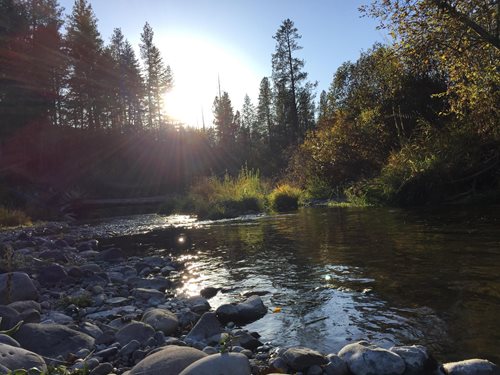SPOKANE –
After decades of conflict over the use of water along Chamokane Creek, the Spokane Tribe, U.S. Department of Justice, and state Department of Ecology have reached an innovative agreement to end the dispute. The agreement centers on a mitigation program that will improve streamflows for fish, allows existing water uses to continue, and provides water for future domestic needs in Stevens County, and on Spokane Tribal lands.
Carol Evans, chairwoman of the Spokane Tribal Business Council, said:
“The Spokane Tribe is very pleased with the settlement agreement reached between the state of Washington, the Tribe and the United States over specific issues within United States, Spokane Tribe of Indians v. Anderson. The settlement is a culmination of four years of mediation between the parties and it addresses several issues that have caused water management problems within the Chamokane Creek Basin since the case was adjudicated in the late 1970s.
“If all of the settlement components are approved by the Court, the settlement and the mitigation program it describes will result in mitigation for the impacts of domestic permit exempt well users in the basin; protect the spring freshet in Chamokane Creek; and allow for comprehensive water management in Chamokane Creek. Overall the Tribe is hopeful the settlement will protect our water rights and fishing rights in Chamokane Creek for many generations.”
Under terms of the agreement, Ecology will provide mitigation to offset the impacts of existing and future domestic water use. A program will be established to improve stream flows and temperatures, allowing fish to migrate upstream. The program will be largely funded by Washington state through Ecology, with cooperation and support from the Spokane Tribe and Bureau of Indian Affairs.
“We are thrilled this landmark water agreement has been reached,” said Ecology Director Maia Bellon. “A combination of creative thinking and sound science has resulted in a solution that improves temperature and streamflows for fish while ensuring current and future domestic water use.”
Historically, impacts of permit exempt domestic wells and stock water uses along Chamokane Creek were considered so small that they did not need to be regulated and were allowed by the state. However, over the past 40 years, scientists have gained a better understanding of how groundwater pumping from wells can impact stream flows in the Chamokane basin.
In the 1970s, the U.S. District Court for Eastern Washington, United States and Spokane Tribe v. Anderson, established that the Spokane Tribe has a senior water right to Chamokane Creek to benefit culturally important fisheries
Litigation and conflict continued in the intervening years, until the federal court ordered the parties to conduct a study, which found a connection between surface and groundwater in the area. Recently, rather than continue litigation, all parties agreed to settle and improve streamflows with a mitigation program.
Chamokane Creek flows along the eastern margin of the Spokane Indian Reservation in Stevens County. Water rights in portions of the 179-square-mile basin were adjudicated in 1979, and oversight of water rights in the basin are within the jurisdiction of the federal court.
For more information, visit Ecology’s Chamokane Creek settlement webpage.
Department of Ecology News Release - May 14, 2019


